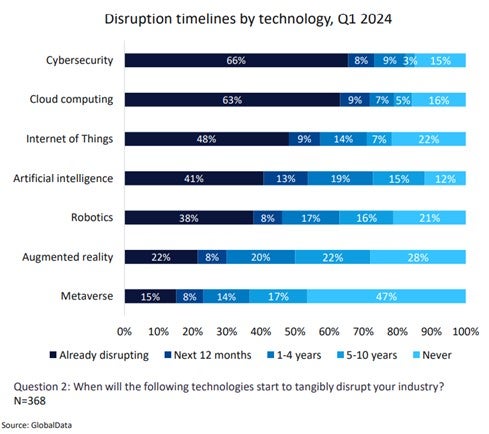
74% of business leaders view cybersecurity as the main disruptive threat to their organisations either currently or over the next twelve months, according to GlobalData’s Tech Sentiment Polls Q1 2024 survey.
The survey asked respondents which technologies are already disrupting their varied industries or would do over the next 12 months, one to four years, five to ten years or never.

Access deeper industry intelligence
Experience unmatched clarity with a single platform that combines unique data, AI, and human expertise.
Fuelled by increasingly sophisticated ransomware and distributed denial of service (DDoS) attacks, cybersecurity is at the forefront of business leaders’ minds.

Prominent cyberattacks have stolen headlines of late.
Just this week, Germany recalled its ambassador to Russia over alleged state-sponsored cyberattacks on Monday (6 May), hours before it was revealed that a hack stole payroll data from the UK Ministry of Defence.
Geopolitical discord has seen governmental infrastructure heavily targeted, like that of Sweden as it attempted to join Nato. But companies including American Express, Change Healthcare, Fujitsu and Roku have all been hit by cyberattacks just this year.

US Tariffs are shifting - will you react or anticipate?
Don’t let policy changes catch you off guard. Stay proactive with real-time data and expert analysis.
By GlobalDataAI vs cybersecurity: which will disrupt more?
More respondents said that cybersecurity (66%), cloud computing (63%) and the internet of things (48%) are already disrupting their business than AI (41%).
AI, however, had the highest percentage of respondents (13%) say it would disrupt their industry over the next twelve months.
This transcends concerns about mass job losses. In defence, AI-powered drones have threatened global security, exemplified by the Israeli Defence Forces’ (IDF) indiscriminate Lavender AI system.
EU regulation is tightening over the potential use of AI in medical device trials. Data collation in the financial services sector has become reliant on AI processing. AI-powered digital twin technologies are increasingly involved in transport logistics.
And, in media, AI companies are signing agreements with news organisations, seen with the Financial Times and OpenAI’s partnership at the end of April.








